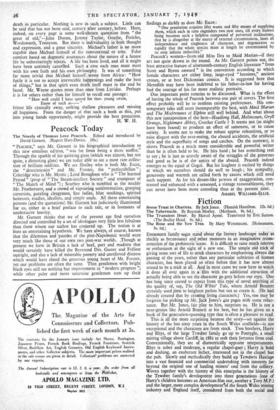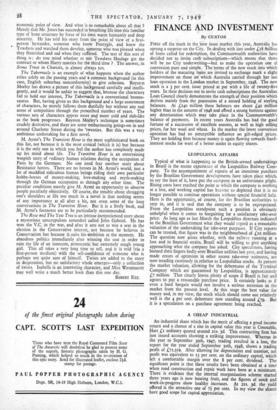Fiction
The Rose and the Yew Tree. By Mary Westmacott. (Heinemann.
8s. 60.) . _
ENoitmouS fainily• sagas stand about the literary landscape today as thickly as brontosauri and other monsters in an imaginative recon- struction of the prehistoric-Scene. If is difficult to raise much interest or enthusiasm at the sight of a new one. The simple old- trick of giving some sort of lffe to stock characters by emphasising always the passing of the years, rather than any particular subtleties of human character, has been-played so often before that it has now almost ceased to be a trick' at all. And in most cases we now have to watch it done all over again in a- fifin with the additional attraction of actually being able to see the character go, grey before our eyes. One has long since ceased to expect from this type of novel anything of the quality of, say, The Old Wales' Tale, where Arnold Bennett certainly used lime to heighten pathos but not to create it. (He had already created that by creating living characters.) Yes, one may be forgiven for picking up Mr. Jack Jones's 42o pages with some reluc- tance. But Mr. Jones, fair play to him, surprises us. He is not a near-genius like Arnold Bennett at his best, but he has given us a book of lhe.generation-spanning type that is often a pleasure to read.
This is all the more surprising because the story—set against the history of the last sixty years in -the South Wales coalfields—is not exceptional and the characters are from stock. Two brothers, Harry and Rhys, of the large Tewdwr family go up to Pontyglo, a small mining village above Cardiff, in 1882 to seek their fortunes from coal. Conventionally, they are of diametrically opposite temperaments. Rhys is sober and moderate,. a regular chapel-goer ; Harry is bold
and dashing, an exuberant lecher, interested not in the chapel but the pub. Slowly and methodically they build up Tewdwrs Haulage into a vast financial and commercial undertaking with interests far beyond the original one of hauling miners' coal from the colliery. Woven together with the history of this enterprise is the history of the Tewdwr family's development into three generations (one of Harry's children becomes an American film star, another a Tory M.P.) and the larger, more complex development"of the South Wales mining industry and England itself, considered from both the social and economic point of view. And what is so remarkable about all that ? Merely that Mr. Jones has succeeded in breathing life into this familiar type of bone structure by force of his own warm humanity and deep sincerity. He has told his story from the point of view of a first- person bystander, someone who knew Pontyglo, and knew the Tewdwrs and watched them develop, someone who was pleased when they flourished and sad when they suffered. The test of this sort of thing is : do you mind whether or not Tewdwrs Haulage get the contract or whom Harry marries for the third time ? The answer, in Some Trust in Chariots, is almost always yes.
The Tabernacle is an example of what happens when the author relies solely on the passing years and ti common background (in this case, English suburban nonconformity) to give cohesion. Royston Morley has drawn a picture of this background carefully and intelli- gently, and it would be unfair to suggest that, because the characters fail to hold our interest, The Tabernacle is a conventional bronto- saurus. But, having given us this background and a large assortment of characters, he merely follows them dutifully but without any real sense of compulsion through the prescribed number of years. The various sets of characters appear more and more cold and slab-like as the book progresses. Royston Motley's technique is sometimes crudely derivative, and there are some- embarrassing goings-on in and around Charlotte Street during the 'twenties. But this was a very ambitious undertaking for a first novel.
M. Ayme's The Transient Hour is the most sophisticated book on this list, not because it is the most cynical (which it is) but because it is the only one in which you feel the author has completely made up his mind about life. The Transient Hour is an entertaining waspish story of ordinary human relations during the occupation of Paris by the Germans. No one need fear another story about Resistance heroes. There are no heroes in M. Aymes world, just a lot of muddled ridiculous human beings riding their own particular hobby-horses of money-making, love-making and myth-making through the German occupation as through any other time. The peculiar conditions merely give M. Ayme an opportunity to observe people peculiarly objectively. Of course, the trouble about shrugging one's shoulders at life too much in a novel is that nothing seems of any importance at all after a bit, not even some of the long conversations in The Transient Hour. But it is a lively book, and M. Aymes footnotes are to be particularly recommended.
The Rose and The Yew Tree is an intense inexperienced story about a mysterious unscrupulous scoundrel called John Gabriel. He has won the V.C. in the war, and after it sets out to win a seat in the election in the Conservative interest, not because he believes in Conservatism but because it.suits his' mbition at the moment. He abandons politics immediately after winning the seat in order to ruin the life of an innocent, aristocratic but extremely tough young girl. This all takes a very long time to tell, and it is told (via a first-person medium) with the self-confidence of someone who is perhaps not quite sure of himself. Twists are added to the story in desperation, but no satisfactory whole emerges—only a collection of twists. Isabella is an interesting character, and Miss Westmacott may well write a much better book than this one day.
ROBERT KEE.







































 Previous page
Previous page